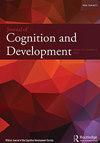执行职能的发展:变革机制与职能压力
IF 1.6
2区 心理学
Q3 PSYCHOLOGY, DEVELOPMENTAL
引用次数: 3
摘要
执行功能(EF)的发展解释认为,领域通用类比过程建立了技能的功能层次结构,这些技能在抽象连续体上变化,并随着时间的推移变得越来越分化。本文首先展示了功能层次结构如何能够捕捉EF发展的重要方面,包括渐进主义、部分分化,以及从被动控制到主动控制的转变。然后,通过展示他们如何以自下而上的增量方式在类似的EF问题之间进行功能类比,详细说明儿童如何在发展中构建这种层次结构。这导致EF结构分化为更适合解决某些目标导向问题的组件,而不是其他组件。这对发展的影响是,儿童最终获得了任务一般性ef,同时也保留了对更广泛的信念、价值观、规范、偏好、相关的运动、程序和具体化知识敏感的目标特定技能。本文还讨论了这种方法与现有方法的相似和不同之处,以及它如何与更广泛的培训和转移、群体和个体差异、重叠的EF功能和领域一般学习等问题联系起来。这一理论所提倡的发展机制有意地借鉴了在其他领域已经被证明的神经心理学、学习和认知过程,因此EF理论可以从其他领域的经验教训中受益,并与其他认知领域更加融合。本文章由计算机程序翻译,如有差异,请以英文原文为准。
The Development of Executive Function: Mechanisms of Change and Functional Pressures
ABSTRACT This developmental account of executive function (EF) argues that domain-general analogical processes build a functional hierarchy of skills, which vary on a continuum of abstraction, and become increasingly differentiated over time. The paper begins by showing how a functional hierarchy can capture important aspects of EF development, including incrementalism, partial differentiation, and a shift from reactive to proactive control. It then details how children construct this hierarchy in development, by showing how they make functional analogies between similar EF problems, in a bottom-up incremental fashion. This results in EF structure which becomes differentiated into components which are more suited to solving some goal-directed problems than others. The developmental implications of this are that children eventually acquire task-general EFs while also retaining goal-specific skills sensitive to wider beliefs, values, norms, preferences, relevant motor, procedural, and embodied knowledge. There is discussion of how this approach is similar to and different from existing accounts, and how it relates to broader issues of training and transfer, group and individual differences, overlapping EF functions and domain-general learning. The developmental mechanisms advocated under this account intentionally draw on neuropsychological, learning and cognitive processes that have been demonstrated in other domains, so that EF theory can benefit from the lessons learned elsewhere and become more integrated with other areas of cognition.
求助全文
通过发布文献求助,成功后即可免费获取论文全文。
去求助
来源期刊

Journal of Cognition and Development
Multiple-
CiteScore
4.00
自引率
0.00%
发文量
29
期刊介绍:
The Journal of Cognition and Development is the official journal of the Cognitive Development Society (CDS). Some CDS members are concerned with basic research or theory; others focus on policy issues and practical applications. The range of interests includes cognitive development during all stages of life, and we seek to understand ontogenetic processes in both humans and nonhumans. Finally, their interests encompass typical as well as atypical development, and we attempt to characterize both biological and cultural influences on cognitive change and continuity.
 求助内容:
求助内容: 应助结果提醒方式:
应助结果提醒方式:


